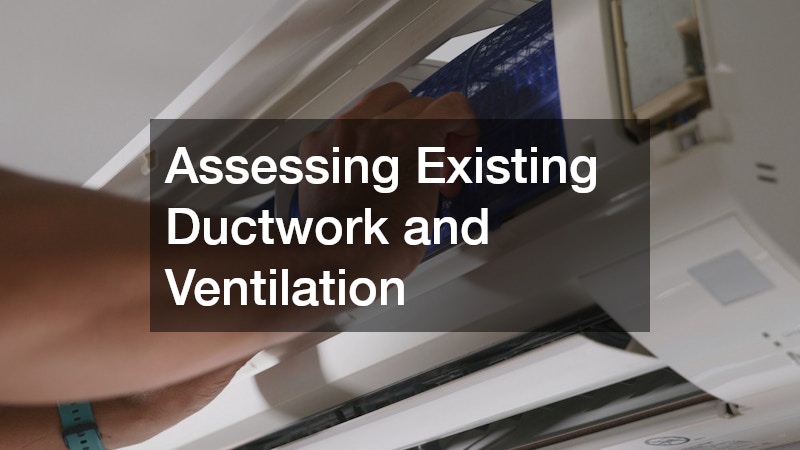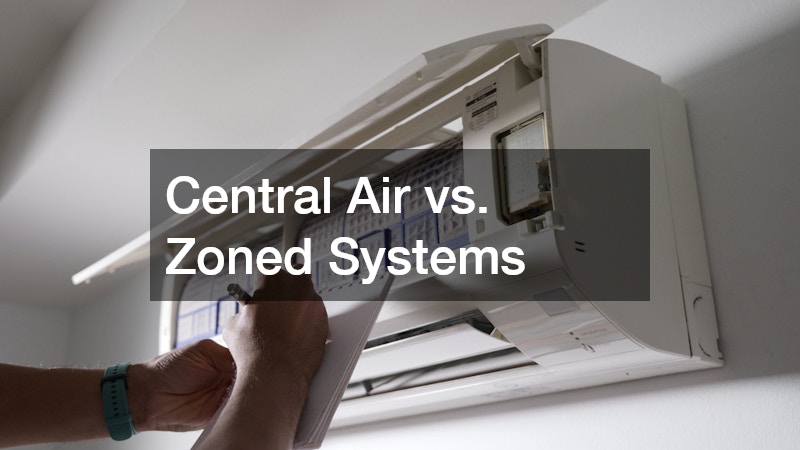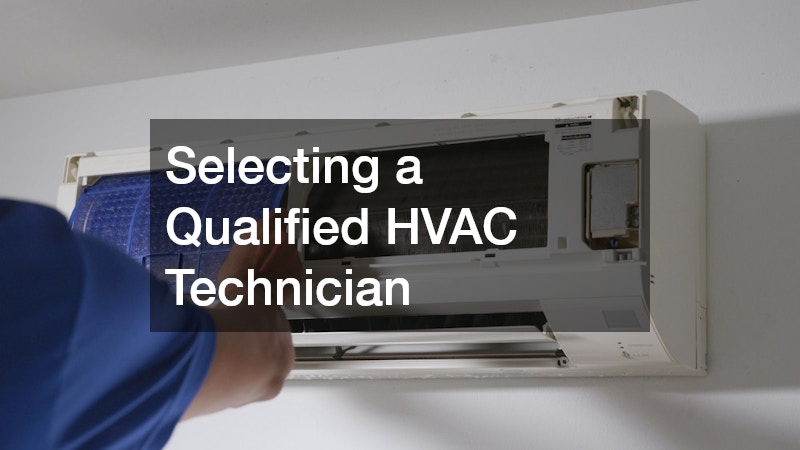Expert HVAC Best Practices for Choosing the Right Unit for Your Home
When it comes to maintaining a comfortable home environment, having a well-functioning HVAC system is essential. HVAC stands for heating, ventilation, and air conditioning, and ensuring that these systems are operating efficiently can have a significant impact on energy costs and home value. In this article, we will explore the best practices for HVAC systems, including evaluating home size and layout, understanding climate considerations, assessing existing ductwork and ventilation, and more.
Impact on Energy Costs and Home Value

One of the key factors to consider when it comes to HVAC systems is their impact on energy costs and home value. By working with a reputable heating and air conditioning company, homeowners can ensure that their systems are running efficiently, which can lead to lower energy bills and increased property value. HVAC best practices focus on regular maintenance, proper installation, and using energy-efficient equipment to maximize performance.
Implementing HVAC practices can not only save homeowners money in the long run but also increase the overall comfort and livability of their homes. Whether it’s upgrading to a more efficient system or sealing ductwork to prevent air leaks, investing in HVAC maintenance and upgrades can pay off in the form of lower energy bills and a higher resale value.
By partnering with a knowledgeable HVAC contractor, homeowners can address any issues with their systems proactively and make informed decisions about repairs or replacements. Working with professionals who understand HVAC practices ensures that the job is done right the first time, saving time, money, and frustration in the long run.
Evaluating Home Size and Layout
Another critical aspect of HVAC best practices is evaluating the size and layout of the home to determine the most efficient system for heating and cooling. A skilled HVAC contractor will take into account factors such as square footage, ceiling height, insulation levels, and window placement to recommend the right system for optimal performance. By properly sizing the HVAC system, homeowners can avoid energy waste and ensure consistent comfort throughout the home.
Properly evaluating the home’s size and layout also involves considering any potential obstacles or challenges that may affect the HVAC system’s efficiency, such as ductwork placement or airflow restrictions. By addressing these issues early on and following HVAC practices, homeowners can maximize the performance and longevity of their systems, ultimately saving money and reducing energy consumption.
Working with an experienced HVAC contractor who understands the importance of assessing home size and layout can make all the difference in the efficiency and effectiveness of a heating and cooling system. By following best practices and customizing solutions to fit the specific needs of the home, homeowners can enjoy optimal comfort and cost savings for years to come.
Understanding Climate Considerations
Climate considerations play a significant role in determining the most suitable HVAC system for a home. Whether it’s a hot and humid climate or one with frigid temperatures, HVAC best practices involve selecting equipment that can efficiently heat or cool the home based on local weather patterns. An expert ac repair service provider can recommend the right system size and type to ensure optimal performance year-round.
In regions with extreme weather conditions, homeowners may benefit from investing in additional features such as zoned heating and cooling or a hybrid system that can adapt to changing climate demands. By understanding climate considerations and working with HVAC professionals who specialize in these areas, homeowners can enhance their comfort and reduce energy consumption.
Partnering with a reputable ac repair service provider who is familiar with the unique climate challenges of the area can help homeowners make informed decisions about their HVAC systems. By considering factors such as humidity, temperature fluctuations, and seasonal changes, homeowners can customize their systems to provide reliable comfort and efficiency in any weather.
Assessing Existing Ductwork and Ventilation

Proper ductwork and ventilation are essential components of a well-functioning HVAC system. HVAC best practices emphasize the importance of assessing existing ductwork for leaks, blockages, or inefficiencies that can compromise system performance. An experienced ac replacement technician can inspect ducts and vents to identify any issues and recommend necessary repairs or upgrades.
By addressing ductwork and ventilation concerns early on, homeowners can prevent air loss, improve airflow, and enhance overall indoor air quality. HVAC professionals understand the critical role that ductwork plays in the efficiency of a system and can provide solutions that optimize performance and reduce energy waste. Following best practices in ductwork design and maintenance can result in significant savings and improved comfort for homeowners.
Working with HVAC services that specialize in ductwork evaluation and ventilation optimization can ensure that the entire system is functioning at peak efficiency. By investing in regular inspections and maintenance, homeowners can prolong the life of their HVAC systems and enjoy consistent comfort without the worry of costly repairs or replacements.
Split vs. Packaged HVAC Systems
When it comes to selecting an HVAC system, homeowners have the choice between split and packaged systems. Split systems, which consist of indoor and outdoor units, are commonly used in residential settings and offer flexibility in terms of installation and operation. On the other hand, packaged systems combine all components in a single unit, making them a space-saving option for homes with limited outdoor space.
Each type of HVAC system comes with its own set of advantages and considerations, and HVAC best practices involve evaluating the specific needs of the home to determine the most suitable option. Working with HVAC professionals who are familiar with both split and packaged systems can help homeowners make an informed decision that meets their comfort and efficiency requirements. By considering factors such as installation cost, system efficiency, and maintenance needs, homeowners can choose the system that best fits their unique circumstances.
Split systems are popular for their versatility and ability to provide precise temperature control in different areas of the home. Packaged systems, on the other hand, offer convenience and simplicity in installation and maintenance. By weighing the pros and cons of each type of system and following HVAC practices, homeowners can select the system that aligns with their priorities and budget.
Heat Pumps and Energy-Efficient Alternatives
Heat pumps are a popular choice for homeowners looking to reduce energy consumption and lower utility costs. These systems work by transferring heat between the indoor and outdoor air, providing efficient heating and cooling throughout the year. HVAC best practices emphasize the benefits of heat pumps, including their high energy efficiency ratings and environmentally friendly operation.
By investing in a heat pump or other energy-efficient alternatives, homeowners can enjoy significant savings on their utility bills while reducing their carbon footprint. HVAC professionals can help homeowners evaluate the benefits of different heating and cooling options and recommend the most suitable system for their home. With proper installation and maintenance, heat pumps can provide reliable comfort and efficiency for years to come.
When considering heat pumps and energy-efficient alternatives, homeowners should take into account factors such as system size, climate considerations, and upfront costs. By working with an experienced air conditioning service provider, homeowners can explore the various options available and choose the solution that best meets their needs and budget. Following HVAC practices in selecting and maintaining energy-efficient systems can lead to long-term savings and improved comfort.
Central Air vs. Zoned Systems

Central air systems and zoned systems offer different approaches to heating and cooling a home, each with its own advantages. Central air systems use a single thermostat to control the temperature throughout the entire house, while zoned systems allow for individual temperature control in different areas or “zones” of the home. HVAC best practices involve understanding the benefits of each system and selecting the one that best suits the homeowner’s needs.
Central air systems are suitable for homeowners who prefer consistent temperatures throughout the home and do not require individualized control in each room. Zoned systems, on the other hand, offer greater flexibility and energy savings by allowing homeowners to adjust temperatures based on usage patterns and personal preferences. By working with HVAC professionals who specialize in central air and zoned systems, homeowners can explore the advantages of each option and make an informed decision.
Whether choosing a central air or zoned system, homeowners can benefit from improved comfort, energy savings, and convenience. HVAC companies with experience in installing and servicing both types of systems can help homeowners customize their heating and cooling solutions to meet their specific needs. By following HVAC practices and considering factors such as home layout, lifestyle, and budget, homeowners can create a personalized comfort experience that enhances their quality of life.
Using the Manual J Load Calculation
The Manual J load calculation is a critical tool used by HVAC professionals to determine the heating and cooling requirements of a home. By evaluating factors such as insulation levels, window quality, and square footage, technicians can accurately size the HVAC system to meet the home’s demands. HVAC best practices involve using the Manual J load calculation to ensure that the system is neither undersized nor oversized, resulting in optimal performance and energy efficiency.
Properly sizing an HVAC system using the Manual J load calculation helps homeowners avoid unnecessary expenses and ensure that their systems operate efficiently in all weather conditions. By working with a qualified plumbing contractor who understands the importance of load calculations, homeowners can receive a customized solution that maximizes comfort and minimizes energy waste. Following HVAC practices in system design and sizing can lead to long-term savings and enhanced performance.
Partnering with HVAC companies that follow best practices in load calculations and system design can provide peace of mind for homeowners seeking reliable and efficient heating and cooling solutions. By prioritizing accuracy and precision in sizing the HVAC system, homeowners can enjoy consistent comfort and energy savings without the guesswork often associated with improperly sized systems. Working with experienced professionals who use the Manual J load calculation ensures that the system is tailored to the specific needs of the home, resulting in optimal performance and efficiency.
SEER and AFUE Ratings Explained
SEER (Seasonal Energy Efficiency Ratio) and AFUE (Annual Fuel Utilization Efficiency) ratings are standardized measures used to evaluate the energy efficiency of HVAC systems. SEER ratings apply to air conditioners and heat pumps, measuring their cooling efficiency, while AFUE ratings apply to furnaces and boilers, measuring their heating efficiency. HVAC companies rely on these ratings to help homeowners understand the energy performance of their systems and make informed decisions about upgrades or replacements.
By selecting HVAC equipment with high SEER and AFUE ratings, homeowners can reduce their energy consumption and lower their utility bills. HVAC best practices involve choosing systems with optimal efficiency ratings that align with the home’s heating and cooling needs. Working with HVAC professionals who explain and prioritize SEER and AFUE ratings can empower homeowners to make energy-saving choices that benefit both their wallets and the environment.
Understanding SEER and AFUE ratings can be instrumental in selecting the right HVAC system for a home and maximizing its energy efficiency. HVAC installation companies that prioritize these ratings and recommend energy-efficient solutions can help homeowners achieve long-term savings and comfort. By following best practices in evaluating efficiency ratings and selecting high-performing equipment, homeowners can enjoy reliable heating and cooling while reducing their environmental impact.
Energy Star and Incentive Programs
Energy Star certification and incentive programs are initiatives designed to promote energy-efficient practices and reward homeowners for choosing environmentally friendly HVAC solutions. Energy Star-rated products meet strict efficiency guidelines set by the Environmental Protection Agency (EPA) and can help homeowners reduce their energy consumption and carbon footprint. HVAC best practices involve exploring Energy Star options and taking advantage of incentive programs to maximize cost savings and environmental benefits.
By opting for Energy Star-certified equipment and participating in incentive programs, homeowners can enjoy financial incentives, rebates, and tax credits that make energy-efficient upgrades more affordable. HVAC installation providers that are knowledgeable about Energy Star products and incentives can guide homeowners through the selection process and help them capitalize on available savings. Following best practices in choosing Energy Star-rated systems and leveraging incentive programs can result in significant returns on investment for homeowners.
Energy Star and incentive programs not only benefit homeowners financially but also contribute to a greener and more sustainable future. By prioritizing energy efficiency and embracing environmentally friendly HVAC solutions, homeowners can reduce greenhouse gas emissions and lessen their impact on the planet. HVAC companies that support Energy Star initiatives and incentive programs can assist homeowners in making eco-conscious choices that align with their values and contribute to a healthier environment for future generations.
Selecting a Qualified HVAC Technician

Choosing a qualified HVAC technician is crucial to maintaining the efficiency and reliability of home heating and cooling systems. HVAC practices involve working with professionals who are licensed, insured, and experienced in installing, repairing, and maintaining HVAC equipment. By selecting a reputable HVAC company or technician, homeowners can ensure that their systems receive expert care and attention.
Qualified HVAC technicians follow industry best practices and adhere to safety standards to deliver superior service and results. Whether it’s diagnosing a problem, performing routine maintenance, or installing a new system, homeowners can trust in the expertise of a qualified technician to get the job done right. By investing in professional HVAC services, homeowners can enjoy peace of mind knowing that their systems are in good hands.
When selecting an HVAC technician, homeowners should look for certifications, references, and reviews to assess the technician’s skills and reputation. By choosing a qualified professional who demonstrates knowledge of HVAC best practices, homeowners can feel confident in the quality of workmanship and the reliability of their heating and cooling systems. Partnering with a trusted HVAC technician ensures that homeowners receive top-notch service and solutions tailored to their individual needs.
Implementing HVAC practices is essential for maintaining efficient, reliable, and cost-effective heating and cooling systems in homes. By evaluating factors such as home size and layout, climate considerations, ductwork and ventilation, system type, energy efficiency ratings, and technician qualifications, homeowners can optimize their HVAC systems for peak performance. Working with experienced HVAC professionals who understand the importance of best practices can help homeowners make informed decisions about system upgrades, maintenance, and repairs.
By following HVAC best practices and prioritizing energy efficiency, homeowners can reduce their energy costs, improve their home’s value, and enhance their overall comfort and well-being. Investing in high-quality HVAC equipment, regular maintenance, and professional services can lead to long-term savings and satisfaction for homeowners. By taking advantage of Energy Star products and incentive programs, homeowners can further maximize their cost savings and environmental benefits. Choosing a qualified HVAC technician ensures that the systems are serviced and maintained by skilled professionals, providing peace of mind and reliable performance.
